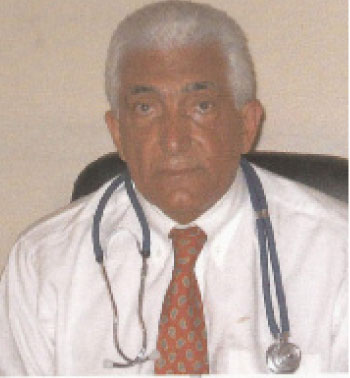
Parkinson’s involves the malfunction and death of vital nerve cells in the brain, called neurons. Parkinson’s primarily affects neurons in the area of the brain. Some of these dying neurons produce dopamine, a chemical that sends messages to the part of the brain that controls movement and coordination. As PD progresses, the amount of dopamine produced in the brain decreases, leaving a person unable to control movement normally.
The specific group of symptoms that an individual experiences varies from person to person. Primary motor signs of Parkinson’s disease include the following.
•Tremor (shaking) of the hands, arms, legs, jaw and face, slowness of movement
•rigidity or stiffness of the limbs and trunk
•postural instability or impaired balance and coordination
Parkinson’s disease affects the way you move. It happens when there is a problem with certain nerve cells in the brain.
Normally, these nerve cells make an important chemical called dopamine. Dopamine sends signals to the part of your brain that controls movement. It lets your muscles move smoothly and do what you want them to do. When you have Parkinson’s, these nerve cells break down. Then you no longer have enough dopamine, and you have trouble moving the way you want to.
Parkinson’s Disease - Cause
Low levels of dopamine, a brain chemical involved in controlling movement, cause symptoms of Parkinson’s disease. Low levels happen when nerve cells in a part of the brain that makes dopamine break down. The exact cause of this breakdown isn’t known.
Scientists are looking for links between Parkinson’s disease and genetics, aging, toxins in the environment, and free radicals. Although these studies are beginning to provide some answers, experts don’t know the exact cause of the disease.
Only a small percentage of people with Parkinson’s have a parent, brother, or sister who has the disease. But abnormal genes do seem to be a factor in a few families where early-onset Parkinson’s is common.
There are many other causes of Parkinsonism, which is a group of symptoms that includes tremor, muscle stiffness, slow movement, and unsteady walking. Parkinsonism mimics Parkinson’s disease, but in fact is not Parkinson’s disease
Parkinson’s is progressive, which means it gets worse over time. But usually this happens slowly, over many years. And there are good treatments that can help you live a full life.
No one knows for sure what makes these nerve cells break down. But scientists are doing a lot of research to look for the answer. They are studying many possible causes, including aging and poisons in the environment.
Abnormal genes seem to lead to Parkinson’s disease in some people. But so far, there is not enough proof to show that it is always inherited.
The four main symptoms of Parkinson’s are:
•Tremor, which means shaking or trembling. Tremor may affect your hands, arms, or legs.
•Stiff muscles.
•Slow movement.
•Problems with balance or walking.
Tremor may be the first symptom you notice. It’s one of the most common signs of the disease, although not everyone has it.
More importantly, not everyone with a tremor has Parkinson’s disease.
Tremor often starts in just one arm or leg or on only one side of the body. It may be worse when you are awake but not moving the affected arm or leg. It may get better when you move the limb or you are asleep.
In time, Parkinson’s affects muscles all through your body, so it can lead to problems like trouble swallowing or constipation.
In the later stages of the disease, a person with Parkinson’s may have a fixed or blank expression, trouble speaking, and other problems. Some people also lose mental skills (dementia).
People usually start to have symptoms between the ages of 50 and 60. But sometimes symptoms start earlier.
Your doctor will ask questions about your symptoms and your past health and will do a neurological exam. This exam includes questions and tests that show how well your nerves are working. For example, your doctor will watch how you move, check your muscle strength and reflexes, and check your vision.
Your doctor will also ask questions about your mood.
In some cases, your doctor may have you try a medicine. How this medicine works may help your doctor know if you have Parkinson’s disease.
There is no lab or blood tests that can help your doctor know whether you have Parkinson’s. But you may have tests to help your doctor rule out other diseases that could be causing your symptoms. For example, you might have an MRI to look for signs of a stroke or brain tumor.
Parkinson’s Disease - What Happens
Treatment may help control symptoms during the early stages of Parkinson’s disease. It is usually started as soon as symptoms begin to affect your ability to work or do daily activities. As the disease progresses, drugs may become less effective.
Early stage
Tremor is usually the first symptom, appearing in just one arm or leg or on only one side of the body. With time, the tremor usually—but not always—spreads to both sides of the body. Joint pain, weakness, and fatigue may occur.
Moderate stage
As the disease gets worse, the person may have slow movement, stiff muscles, and poor coordination. He or she may have problems with tasks such as writing, shaving, or brushing teeth. Changes in handwriting are common.
Problems with posture and balance develop. A person with Parkinson’s tends to walk in a stooped manner with quick, shuffling steps.
Advanced stage
After several years, as muscle stiffness and tremor increase, the person may become unable to care for him or herself. He or she may be confined to a wheelchair or bed.
People who have taken medicine for several years may not only notice their symptoms getting worse but also may start to have other movement problems. These motor fluctuations can be reduced somewhat by making changes in the person’s medicine, but they can be difficult to control and may further complicate treatment.
Dementia may develop in up to one-third of people who have late-stage Parkinson’s disease.1Dementia symptoms may include disorientation at night, confusion, and memory loss. Treatment for Parkinson’s disease can also contribute to this problem.
Parkinson’s Disease - Symptoms
Symptoms of Parkinson’s disease differ from person to person. They also change as the disease progresses. Symptoms that one person gets in the early stages of the disease, another person may not get until later—or not at all.
Symptoms typically begin appearing between the ages of 50 and 60. They develop slowly and often go unnoticed by family, friends, and even the person who has them.
Important It is possible that the main title of the report Parkinson’s Disease is not the name you expected. Please check the synonyms listing to find the alternate name(s) and disorder subdivision(s) covered by this report.
The disease causes motor symptoms and non-motor symptoms. Motor symptoms are those that have to do with how you move. The most common one is tremor.
Tremor
Tremor, or shaking, often in a hand, arm, or leg, occurs when you’re awake and sitting or standing still (resting tremor), and it gets better when you move that body part.
Tremor is often the first symptom that people with Parkinson’s disease or their family members notice.
At first the tremor may appear in just one arm or leg or only on one side of the body. The tremor also may affect the chin, lips, and tongue.
As the disease progresses, the tremor may spread to both sides of the body. But in some cases the tremor remains on just one side.
Emotional and physical stress tends to make the tremor more noticeable. Sleep, complete relaxation, and intentional movement or action usually reduce or stop the tremor.
Although tremor is one of the most common signs of Parkinson’s, not everyone with tremor has Parkinson’s. Unlike tremor caused by Parkinson’s, tremor caused by other conditions gets better when your arm or hand is not moving and gets worse when you try to move it.
The most common cause of non-Parkinson’s tremor is essential tremor. It’s a treatable condition that is often wrongly diagnosed as Parkinson’s.
Other common symptoms
Besides tremor, the most common symptoms include:
•Stiff muscles (rigidity) and aching muscles. One of the most common early signs of Parkinson’s is a reduced arm swing on one side when you walk. This is caused by rigid muscles. Rigidity can also affect the muscles of the legs, face, neck, or other parts of the body. It may cause muscles to feel tired and achy.
•Slow, limited movement, especially when you try to move from a resting position. For instance, it may be hard to get out of a chair or turn over in bed.
•Weakness of face and throat muscles. It may get harder to talk and swallow. You may choke, cough, or drool. Speech becomes softer and monotonous. Loss of movement in the muscles in the face can cause a fixed, vacant facial expression, often called the “Parkinson’s mask.”
•Difficulty with walking and balance.
•A person with this disease is likely to take small steps and shuffle with his or her feet close together, bend forward slightly at the waist, and have trouble turning around. Balance and posture problems may cause frequent falls. But these problems usually don’t happen until later on.
• Freezing, a sudden, brief inability to move. It most often affects walking.
A small number of people have symptoms on only one side of the body that never move to the other side.
Non-motor symptoms
Parkinson’s disease can cause many other symptoms that aren’t related to how you move. These can be disabling and may include things like constipation, sleep problems, and depression.
There are many other conditions with symptoms similar to Parkinson’s disease. Some of these may be reversible.
Parkinson’s Disease - When to seek help
If you develop a tremor
Urgent medical care isn’t needed if you have had a tremor—shaking or trembling—for some time. But you should discuss the tremor at your next doctor’s appointment.
If a tremor is affecting your daily activities or if it is a new symptom, see your doctor sooner
A written description will help your doctor make a correct diagnosis. In writing your description, consider the following questions:
•Did the tremor start suddenly or gradually?
•What makes it worse or better?
•What parts of your body are affected?
•Have there been any recent changes in the medicines you are taking or how much you are taking?
For further information please seek advice from medical professionals at various Government Hospitals, NGO’s and private Clinics, call on Afri radio every wed. from 9-9.30,text
Dr Azadeh on 7774469 or azadehhassan@yahoo.co.uk
Author: Dr H. Azadeh, Senior Lecturer University of the Gambia, Senior Consultant in Obstetrics & Gynecology




